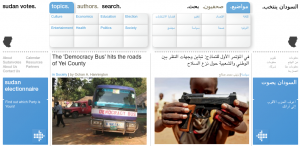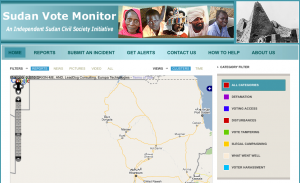In a December 2009 Global Voices article titled “ICT4D: Past mistakes, future wisdom,” [1] Aparna Ray points out that many technology for development projects have “started with a bang and later died with a whimper.” According to a recent article [2] in the Financial Times, such is the fate of a multimillion dollar World Bank plan to supply Juba, the capital of Southern Sudan, with computers and Internet access.
According to Laurence Clarke, who heads the World Bank's program in the country and was interviewed for the article, the failure was not due to a lack of equipment or support. Instead, the problem is a lack of will:
Laurence Clarke, head of the bank's south Sudan programme, explains that fund money was used to buy computers, software and equipment for satellite links in Juba, the south's threadbare capital. But then “all kinds of problems came up,” he says….
“Some of the ministers apparently decided they were too old to learn to use a computer, and so they showed no enthusiasm.” In some cases even their younger assistants did not know how to log on. “So the system is lying there…moribund,” Mr Clarke says.
The recent surge in availability of mobile phones [3] and Internet access [4] in Africa has prompted considerable enthusiasm regarding the use of these technologies for everything from marketing [5] and e-commerce [6] to tracking crop diseases [7] and reminding HIV/AIDS and tuberculosis patients [8] to take their medicine. But the news from Southern Sudan forces the question: is the hype surrounding information and communication technology (ICT) justified? And how can those of us who work in this field make sure that our efforts don't result in moribundity?
As a researcher for the Technology for Transparency Network [9], I'm particularly interested in the way that ICT can help engage citizens in the governance of their country and encourage governments to be both transparent and accountable. Many projects are successfully using technology for transparency; David Sasaki's recent review [10] of the network's first eight case studies shows as much. But, as the situation in Juba shows, technology does not magically lead toward better governance.
Sudanese blogger and Global Voices author Drima [11] believes that Internet and mobile phones are not enough. “ICT is merely that, a technology. Its real usefulness is ultimately something that can only be realized if the users utilize such technology skillfully towards a good goal,” he writes in an e-mail.
If technology is to have an impact, Drima says, support must come not only from donors, but from within:
“When it comes to attitudes and goals, this is something the Southern Sudanese need to fix. And before we can even get into this whole idea of ICT as some kind of ‘silver bullet’ we really need to address many underlying concerns, beginning with corrupt leadership and destructive tribalism.”
As Sudan moves towards elections in April, technology has the potential to play a major role in both engaging citizens and in monitoring the political process. Sudan Votes [12], a bilingual web site sponsored by German organization Media in Cooperation and Transition [13] along with Sudanese organizations Teeba Press [14] and the Association of Inter-Media, hopes to “enhance the quality of media coverage on the elections” and “promote a better understanding across language barriers.” The site features articles on topics ranging from politics to health and culture, as well as a Sudan Electionnaire [15] to help citizens learn more about the country's political parties.
Sudan Vote Monitor [17], led by the Sudan Institute for Research and Policy [18], plans to use Ushahidi [19] to enable citizens to monitor and report on the elections.
In an election where “many citizens are unfamiliar with basic election processes, are opposed to multi-party competition and have doubts about whether the vote will be fair,” [21] these projects may play critical roles in educating people and documenting possible problems with the voting process. In order to be successful, however, they must first find a way to convince citizens of their usefulness.
Both Sudan Votes and Sudan Vote Monitor appear to have substantial Sudanese involvement at the ground level, which may help them succeed where the World Bank program has failed. As the elections loom nearer, I'll be watching closely to see how these organizations unfold. Will they fall flat, ignored and unused by Sudanese citizens? Or will they manage to translate technology into true civic engagement?

